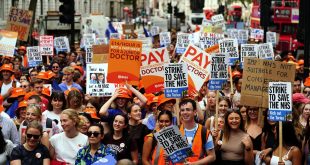The UK’s economic recovery paused prior to the arrival of the Omicron variant of Covid and the dampening impact of the government’s plan B restrictions on consumer spending in the Christmas shopping period, a new survey shows.
Businesses put the blame for a decline in sales in the fourth quarter on spiraling inflation and shortages of imported goods, meaning that an expansion during the spring and summer ground to a halt, according to the British Chambers of Commerce’s quarterly survey.
In a message, the department said that many respondents to its survey of nearly 5,500 firms said that they were running low on cash and had scrapped investment plans to stay afloat into the new year.
Sales growth stalled as companies struggled with the “mounting headwinds” of inflation, a scarcity of skilled workers, and difficulties sourcing products from overseas, Suren Thiru, the BCC’s head of economics, said.
“The persistent weakness in cash flow is troubling because it leaves businesses more exposed to the economic impact of Omicron, rising inflation and potential further restrictions,” he said.
According to the survey, the prospect of Bank of England officials increasing interest rates was another concern for companies that had taken on extra debt during the past 20 months to cope with the pandemic. In December, the bank raised rates to 0.25%.
Meanwhile, a slew of reports have shown the country’s economy heading into a challenging spring, with a strong increase in consumer prices badly affecting household disposable incomes and weakening consumer confidence.
The consumer prices index (CPI) soared to 5.1% in November following persistent increases in oil and gas prices and other commodities, including wheat and copper, according to official figures.
Consumer spending has stalled the recovery, accounting for over 80% of Britain’s growth, whereas spending on government services such as the NHS has made up much of the difference.
 Alghadeer TV Alghadeer TV
Alghadeer TV Alghadeer TV
